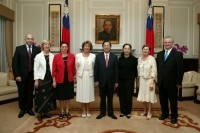President Chen Receives the Delegation of the French Senate's Taiwan-France Friendship Group and its Chairwoman, Monique Papon

Besides, Chuang Shih-han, the Taiwan-France Inter-Parliamentary Amity Association's president, led a delegation to visit France last month, where they received warm welcome and reception from their hosts. For this, the president also expressed his gratitude to the visitors.
The president pointed out that the volume of Taiwan-France trade reached 4 billion Euro last year. Taiwan is France's sixth biggest export market in Asia and also is its fifth biggest importer at the same time. The president hopes that both sides could go on strengthening bilateral trade and business ties built on the present basis. The president is appreciative of the French government's help in agreeing to sell Taiwan Lafayette frigates and Mirage 2000 fighters, which are now the island's major defensive weaponry, contributing greatly to Taiwan's security.
The president further stated that he could understand French President Jacques Chirac's tilt towards China because of global strategy considerations, by taking such actions as opposing Taiwan's "peace referendum" in 2004 and proposing that the EU lift its arms embargo against China, which are regrettable as a matter of fact. The president said that the France's Fifth Republic had held at least ten referendums. Even during Chirac's presidency, referendums were held, including a referendum on whether the French people are going to support the European Constitution was held on May 29 this year.
President Chen emphasized that "Liberte, Egalite, Fraternite" is the spirit of the French Revolution, which is also the basic idea of the country. Therefore, it is unacceptable to us that every country in the world including France enjoys such basic rights and universal values, and only Taiwan is deprived from these basic rights.
President Chen took the view that President Chirac had obviously defiled his own country's nation-founding spirit. Besides, the reason why the European Union imposed the weapon sales embargo on China 16 years ago was because China violated human rights by persecuting students at the Tienanmen Square. Since then, human rights conditions in China haven't obviously improved, including the freedom of religion, freedom of press and the persecution of Falun Gong. In addition to this, they even passed the "Anti-separation Law" with the aim of using force, non-peaceful means to resolve cross-strait disputes. All these acts are contravened to the principle of "peace" and universal values and that is also the reason why the democratic countries like the United States and Japan show grave concern over this development.
The president also said that the Republic of China's constitutional framework was deeply influenced by the French constitution. France is a country known for its bi-cephalic system. Taiwan's system is somewhat like the French system but in actuality is not completely like it.
Therefore it creates quite a big problem to us. Whether we should adopt the French's bi-cephalic system, the U.S. presidential system or Japan's cabinet system in the current constitutional re-engineering is an issue which calls for study and review. It is hoped that the visitors could offer their views on the advantages and disadvantages of the bi-cephalic system.
The visitors expressed their gratitude and admired the calmness of the government and the people for facing the attack of the typhoon and handling it with very high efficiency. The visitors also said that they will convey President Chen's statement to the highest authority of France so that they understand these important messages.
Regarding the visitors' question about Taiwan's future and the course that the cross-strait relationship is going to take, President Chen reiterated the three points concerning Taiwan's sovereignty, which are: "The Republic of China is an independent sovereign country; its sovereignty is vested in its 23 million people; and any change in Taiwan's future can only be decided by the 23 million people of Taiwan."
The president emphasized that he doesn't exclude any possibility on Taiwan's future and the political relationship with China. The most important thing is to respect the freedom and choice of democracy of the 23 million people. The goal that the 23 million people seek is to preserve the democracy that they so hardly fought for, the economic prosperity and progress of society.
The president said that most people in Taiwan do not wish their country to be annexed by China, like the situation in Hong Kong, becoming a local government or a special administrative region. Therefore, 12 days after China passed the "Anti-separation Law," a million Taiwan people marched on the streets on March 26 to call for "Democracy, Peace, Protect Taiwan." "Democracy" stands for respecting Taiwanese people's free will and choice; "Peace" stands for the rejection of using force or non-peaceful means to deal with any issue; "Protect Taiwan" stands for keeping the island from any invasion and annexation. The president said that under these three principles, Taiwan will be happy to start dialogue and negotiations with China.
The president pointed out that economic interaction and travel between Taiwan and China are frequent, giving the impression that distances between these two countries are shorter. But in fact, political differences still exist, including the passage of the "Anti-separation Law" and China's holding back and boycotting Taiwan in the international organizations such as the World Health Organization.
These facts have made the distance between the two countries longer and longer. In particular, the "Anti-separation Law" that allows China to freely decide when to use military force to invade Taiwan, has made Beijing the lawmaker, the umpire and the law enforcement officer at the same time. This is a very dangerous situation. If the European Union lifts the weapon sales embargo against China, it would mean that the European Union encourages and supports China to use military force and non-peaceful means to invade the democratic Taiwan.